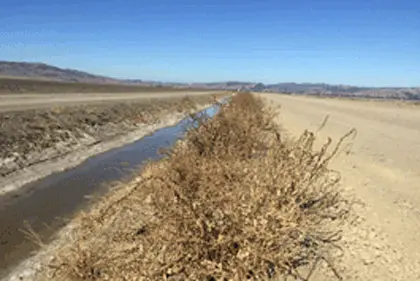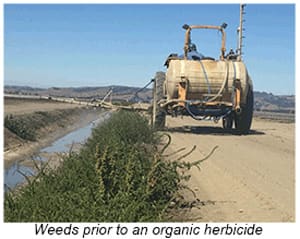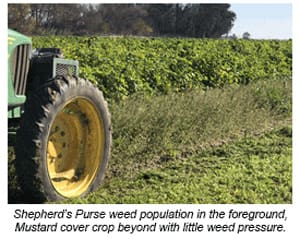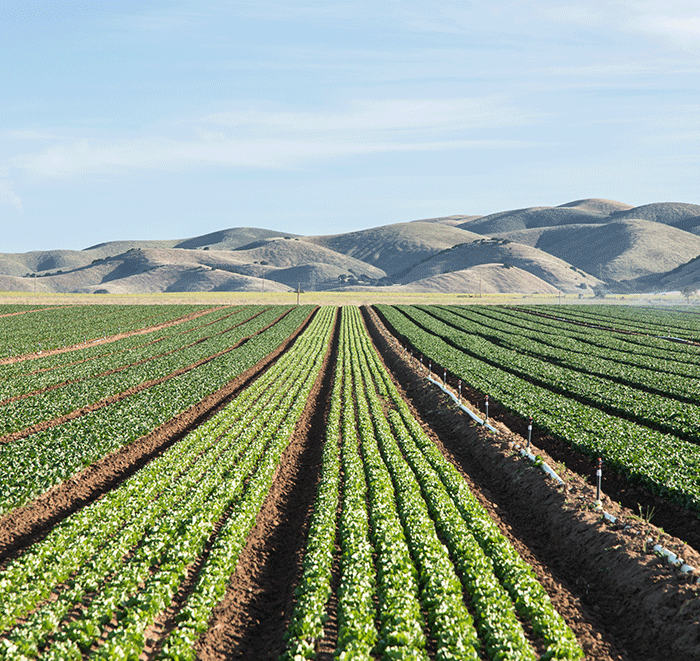
Weed Management
 Most weeds are better adapted to the environment and compete with crops for resources like water, nutrients, and sunlight. When growing a row crop, it is critical to get a head start on the weeds, otherwise, they will outcompete the crop for resources. Some weed species lay dormant for a long period of time until the right environmental conditions are present to germinate, but most weed species we deal with as crop consultants are persistent within a cropping system; they require the same growing conditions as the crop that is being grown. In permanent tree and vine crops, weeds compete for water and nutrients and harbor disease and insects, so control is also critical.
Most weeds are better adapted to the environment and compete with crops for resources like water, nutrients, and sunlight. When growing a row crop, it is critical to get a head start on the weeds, otherwise, they will outcompete the crop for resources. Some weed species lay dormant for a long period of time until the right environmental conditions are present to germinate, but most weed species we deal with as crop consultants are persistent within a cropping system; they require the same growing conditions as the crop that is being grown. In permanent tree and vine crops, weeds compete for water and nutrients and harbor disease and insects, so control is also critical.
One of the most important ways to manage weeds in an organic system is to never let weeds go to seed. One weed plant can have anywhere from hundreds to millions of seeds per plant, depending on the species of weed. This is easier said than done. It takes diligent management and thinking outside the box to ensure weeds never go to seed.
One of the most widely used methods for weed control is cultivation. Kill as many weeds through physical disturbance by cultivating in between the crop, vines or trees. In the age of no-till, this can be challenging. Researchers continue to look for new hardware ideas for tillage and weeding in established crops, e.g. ARS in Salinas, CA. It opens the door to look into novel new approaches like robotics, flames and even electrocution. There are those technologies out there!
In some cropping systems, pre-irrigation can be utilized prior to planting the crop to get early weed seed germination. Your grower could then do light cultivation, so not to bring up buried weed seed, killing that first flush of weeds. For a slow germinating crop, with an early flush of weed seed prior to the emergence, an organic herbicide could be used to kill that first flush of weeds without injuring the crop. There is no residual carryover of certain organic herbicides, so if the crop is not contacted, it will not be affected.
Cover crops are a very good winter time weed management tool. They can outcompete weeds and take up that space. If mowed at strategic times and the mulch thrown on berms in tree or vine crops, this could aid in organic matter management by acting as a mulch cover and reducing weed emergence on the berm.
Finally, when all other methods have been used, a grower can choose to send the weeding crew through, but this can sometimes be cost prohibitive because of the tight labor market and increasing minimum wage increases.
As an organic input provider, WE (pun intended) work with organic herbicides that offer some control of all sizes of weeds, depending on the rate (v/v) of product used and proper mode of application. All organic herbicides have contact activity only, so if the weed is not sprayed with the proper volume of product to water, and full coverage is not achieved, the herbicide application will not be efficacious.
 There are few options for organic herbicides that are efficacious. The one that has proven to be the most reliable is Suppress® from Westbridge. For Suppress to work to its full potential, the spray solution must be buffered to pH 4.5 – 5 with Trifol® with no additional adjuvant used. The v/v is also important, depending on the size of the weeds. The larger the weed, the higher the v/v with optimum coverage. See the label included with this newsletter.
There are few options for organic herbicides that are efficacious. The one that has proven to be the most reliable is Suppress® from Westbridge. For Suppress to work to its full potential, the spray solution must be buffered to pH 4.5 – 5 with Trifol® with no additional adjuvant used. The v/v is also important, depending on the size of the weeds. The larger the weed, the higher the v/v with optimum coverage. See the label included with this newsletter.
There are some other new herbicides on the market from Marrone and another one called Weed Slayer that claim systemic activity. These herbicides are new and more trials need to be done, but these are some of the new options on the way. Stay tuned for more information on these other products as we learn more.
Organics is a whole systems approach that incorporates good farm hygiene, soil building inputs, biodiversity, and pest control practices to ensure a sustainable healthy farm.

